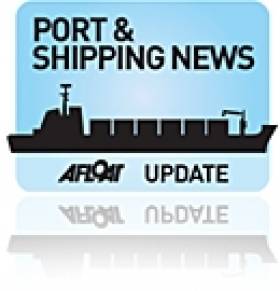Displaying items by tag: genmar companion
Successful Transfer of Cargo Completed
#SHIPPING – The successful transfer of 54,305 tonnes of vacuum gas oil from the vessel Genmar Companion to the BW Seine in Belfast Lough is now complete.
The Genmar Companion had been sheltering off the Copeland Islands since reporting a crack on its deck on 16 December. In order for repairs to take place in Belfast Harbour it was necessary to remove the cargo of oil in Belfast Lough by ship to ship transfer; due to there being no shore reception facilities in Belfast Harbour for a tanker of this size. The operation to transfer the vacuum gas oil was delayed several times due to the extreme weather, but was able to commence yesterday (Friday 6 January).
Hugh Shaw, The Secretary of State's Representative (SOSREP) Maritime Salvage and Intervention, said:
"I am delighted that the ship to ship transfer operation has now been successfully completed, the exclusion zone that was in place will be removed at midnight tonight. I would like to take this opportunity to offer my thanks to all concerned with the operation. In particular I would like to thank Fendercare and the masters and crew of both the Genmar Companion and BW Seine for their professionalism in carrying out the transfer in extremely difficult weather conditions experienced over the past week. In addition the operation could not have taken place without the support of the ship owners/operators, Belfast Harbour, Svitzer Towage and the Maritime and Coastguard Agency.
Finally, I would like to thank the Northern Ireland Environment Agency and Northern Ireland Assembly for supporting the decision to carry out the operation in Belfast Lough, which prevented any further risk to the Genmar Companion or the environment had it been necessary for the damaged ship to seek an alternative place of refuge in less sheltered waters."
Alex Attwood, Northern Ireland Environment Minister, said:
'I think we are all relieved that the operation has now been concluded successfully and that there has been no damage to the Northern Ireland coastline, one of our most beautiful assets. There have been considerable challenges in managing an operation of this nature during the stormy conditions we have been having. I would like to thank the Captains and crew of both vessels who worked throughout the night to achieve a successful outcome. I would also like to commend the Secretary of State's Representative, Hugh Shaw, for his thoroughness and patience in handling this incident. At all stages he has kept both me and my staff fully appraised of the developments in our combined efforts to ensure that our marine environment was protected. Most importantly, I am delighted that the environmental sensitivities were recognised and took precedence over commercial considerations throughout the incident."





























































